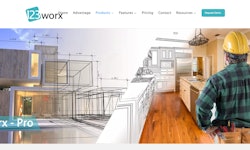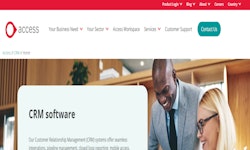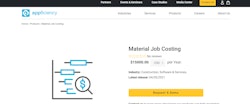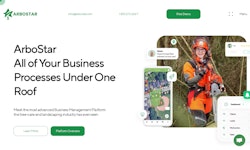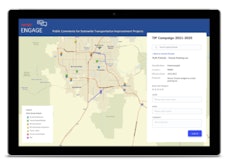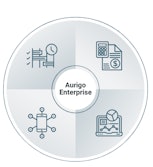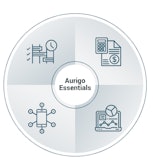Construction ERP (Enterprise Resource Planning Software)
LATEST CONSTRUCTION ERP INSIGHTS
- 2024 Construction ERP Snapshot: Executive Insights
- What Contractors Should Know About Construction ERP
- Composable Construction ERP with IFS at Procore Groundbreak
- Blackware Technologies Launches Construction ERP on Odoo
- Interior Contractor Streamlines AP with Stampli and Sage 300 CRE
- SoftwareOne MTWO Delivers 5D BIM Project Management
- Quickbase Augments Construction Software No-Code Platform with AI
- Why Construction ERP Success Is Up to You Alone
- The Future of On-Premise Construction ERP
WHAT IS CONSTRUCTION ERP?
Enterprise resource planning (ERP) software for construction is business finance and management software optimized for construction contracting quote-to-cash business cycles. While construction ERP may often start at the general ledger and accounting, some modern construction project management software products may encompass everything from bidding and estimating to work-in-progress, progress tracking, project inventory, equipment asset management—everything necessary to run the business. In these cases, there will be little difference between a construction software product like Procore or construction ERP. If anything, construction software products that lack the general ledger may go deeper into operations than construction ERP that may be primarily used for cost tracking and ensuring profitable execution of projects.
123Worx
Appficiency
Aptora
ArboStar
Archdesk
Aurigo Software
Austin Lane Technologies Inc.
LATEST CONSTRUCTION ERP INSIGHTS
- 2024 Construction ERP Snapshot: Executive Insights
- What Contractors Should Know About Construction ERP
- Composable Construction ERP with IFS at Procore Groundbreak
- Blackware Technologies Launches Construction ERP on Odoo
- Interior Contractor Streamlines AP with Stampli and Sage 300 CRE
- SoftwareOne MTWO Delivers 5D BIM Project Management
- Quickbase Augments Construction Software No-Code Platform with AI
- Why Construction ERP Success Is Up to You Alone
- The Future of On-Premise Construction ERP
WHAT IS CONSTRUCTION ERP?
Enterprise resource planning (ERP) software for construction is business finance and management software optimized for construction contracting quote-to-cash business cycles. While construction ERP may often start at the general ledger and accounting, some modern construction project management software products may encompass everything from bidding and estimating to work-in-progress, progress tracking, project inventory, equipment asset management—everything necessary to run the business. In these cases, there will be little difference between a construction software product like Procore or construction ERP. If anything, construction software products that lack the general ledger may go deeper into operations than construction ERP that may be primarily used for cost tracking and ensuring profitable execution of projects.
CONSTRUCTION ERP FOR HARD BID JOBS
When a contractor gets a design and executes against it for a fixed price, cost management is critical. The longer the project lasts, and the more complex it is, the more opportunity there is to drift beyond timeline and scope. Construction ERP in this environment will need to include powerful commercial management tools to ensure visibility of all project costs accrued, and balance that against what the contractor is able to bill.
CONSTRUCTION ERP FOR DESIGN-BUILD JOBS
Design-build introduces a collaborative and design element, and some professional services that cannot be considered overhead but must be tracked in construction ERP. ERP for contractors involved in this value-added approach need to encompass that preconstruction work in a billable process. They also need construction ERP that can help them collaborate on processes and share documents with the owner as well as a far-flung team of subcontractors and suppliers.
CONSTRUCTION ERP FOR ENGINEER PROCURE CONSTRUCT CONTRACTORS
Engineer procure construct (EPC) as a delivery system places additional risk on the contractor, and the complex projects delivered in this fashion require construction ERP that can leverage more advanced management approaches including work breakdown structures (WBS) and cost breakdown structures (CBS). Materials procurement is also challenging, with some long lead-time items and often materials that fluctuate in price over the course of the project. Once material is acquired, it often must be inspected and managed so as to be available at the required moment on the project.
CONSTRUCTION ERP FOR REPETITIVE OR SMALL JOBS
Thanks to multi-tenant software-as-a-service, smaller contractors or those involved in small jobs or field service settings like break-fix repair and installation can access powerful construction ERP. In some cases, this may present primarily as field service management software, but in fact covers the quote-to-cash lifecycle and beyond.
CONSTRUCTION ERP FOR OFFSITE OR MODULAR CONTRACTORS
Offsite, modular, volumetric, panelized—contractors and factories engaging in these approaches need not just construction ERP, but in essence, manufacturing ERP for shop-based operations. Between specialist ERP for offsite fabrication and construction ERP that includes or can be extended with shop-based manufacturing tools, there are options for contractors.
CONSTRUCTION ERP FOR COMPONENTS AND MATERIALS PROVIDERS
Providers of civil and heavy materials like concrete, aggregate or asphalt need ERP for their production operations as well as material deployment in the field. Some building component or systems manufacturers may also play a role in putting their product in place on site, and need both field-based and shop-based tools that are integrated with the rest of the enterprise.
CONSTRUCTION ERP FOR OWNERS, OPERATORS AND DEVELOPERS
Organizations that keep possession of an asset post-commissioning, or even those operating on an operations maintenance and service (OMS) contract, need broader construction ERP functionality that extends beyond the construction phase. Software must address pre-construction phases like planning, and post-commissioning phases like maintenance, asset management, lifecycle extensions and rebuilds. In this setting, construction ERP becomes one component of an asset lifecycle management software approach.
SHOULD MY CONSTRUCTION ERP BE IN THE CLOUD?
Micro-economics and advancing technology mean current business software like construction ERP products are primarily built not only in the cloud, but on architectures that take advantage of the scalability of the cloud infrastructures. This means the vendor and user do not need to pay for all of the compute capacity required during peak times on a regular basis, but rather the amount of compute power dedicated to the software will scale up when needed with no performance issues. Some of these approaches to delivering software, like multi-tenant software-as-a-service (SaaS) lower cost in other ways, even while making construction ERP software more profitable for the vendor to offer to contractors. Newer software built in the cloud will also be easier to extend through integrations because application programming interfaces (APIs) are more central to modern software design. Construction ERP designed to be used on-premise may have APIs that have been added relatively recently, but their number and their ability to expose various parts of a dataflow to integration at precisely the right point to solve a problem may be limited. On-premise construction ERP will often be extended by cloud-native software for functions that happen away from the office, or even beyond the accounting function.
CONSTRUCTION ERP SOFTWARE ON PREMISE
Some mature and proven construction ERP software that has been in the market for decades will be available on-premise, usually with an option for cloud hosting by the vendor. Provisioning this software in the cloud will typically help the contractor with application administration and other tasks. In some cases, each new version of the construction ERP software will still need to be rolled out carefully and regression tested.
In some situations, a contractor may have poor internet connectivity at their location, or will have invested substantially in servers and infrastructure. Running construction ERP software on premise will then be appropriate if the vendor continues to offer this option and a perpetual license to use the software and the availability of internal IT staffing and resources to manage the application.
HOW IS CONSTRUCTION ERP DIFFERENT FROM MANUFACTURING ERP
“ERP is a term coined by Gartner in 1990, modifying the manufacturing requirements planning (MRP), which in turn was originated more or less by IBM engineer Joe Orlicky as a computerized approach to satisfying the inventory needs of the Toyota Production System. ERP in essence added functions beyond inventory control to an enterprise solution, including financial accounting, project management, business intelligence, sales and often customer relationship management (CRM).
“While MRP and ERP originated for manufacturing, it evolved for the requirements of project-centric manufacturers like those delivering engineer-to-order (ETO) and for configure-to-order (CTO) approaches. While tier one ERP software from SAP, Microsoft or Oracle have a footprint in the largest construction and engineering companies, that footprint may end at financials, with either independent software vendor (ISV) solutions extending the solution into construction disciplines like estimating and project delivery. Other ERP products from vendors more tightly aligned with construction, like Sage, IFS, Foundation and Trimble Viewpoint Vista and Spectrum, may go deeper into the project operations. But these solutions may also, in their account base, rely on integrations with ubiquitous solutions like Procore, or point solutions for specific disciplines like field productivity or construction equipment fleet management.”
The article on IRONPROS provides example lists of ERP software that serves multiple industries, specialized construction ERP vendors and independent software vendors (ISV) that extend generalist ERP for construction.
